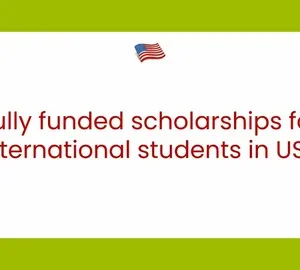How to Get Scholarships for MBA Programs in 2025
Introduction:
Why MBA Scholarships Matter in 2025

Thinking about earning an MBA in 2025? It’s a brilliant decision that can fast-track your career, expand your network, and boost your earning potential. But there’s no sugarcoating it — MBA programs are expensive. Tuition alone can reach tens of thousands of dollars, not to mention accommodation, books, exams, and other living expenses. This can put many talented candidates on the sidelines before they even start.
That’s where scholarships come into play. Scholarships are a fantastic way to ease the financial load, sometimes covering part or all of your tuition and even living expenses. They also act as a prestigious stamp on your profile, showing that you stood out among hundreds or thousands of applicants.
In this comprehensive guide, I’ll walk you through how to get scholarships for MBA programs in 2025, breaking down the types of scholarships, how to position yourself as a prime candidate, and revealing some of the best scholarship programs available today. Whether you’re a recent graduate, mid-career professional, or international student, this guide is for you. Let’s get started!
Understanding Different Types of MBA Scholarships
Knowing what kinds of scholarships exist is the first step to winning one. Let’s unpack the most common types you’ll encounter.
Merit-Based Scholarships
Merit scholarships reward excellence. These scholarships look for candidates who have demonstrated superior academic performance, leadership qualities, and outstanding professional achievements. They’re often highly competitive because many MBA programs want to attract the brightest minds.
-
Example: Harvard Business School offers merit scholarships to applicants with strong GMAT scores and exceptional professional backgrounds.
-
Pro Tip: Highlight any awards, honors, or leadership roles in your application.
Need-Based Scholarships
Not all scholarships reward only merit. Many institutions offer aid based on financial need, aimed at helping those who wouldn’t otherwise be able to afford the program. These scholarships require you to provide detailed financial documentation, such as tax returns and bank statements, to prove eligibility.
-
Example: The Wharton School offers financial aid packages that combine scholarships and loans based on need.
-
Pro Tip: Be transparent and thorough with your financial documents to avoid delays.
Diversity and Inclusion Scholarships
Diversity scholarships aim to create a richer learning environment by supporting students from underrepresented groups. This could include women, ethnic minorities, LGBTQ+ individuals, and international students from certain countries.
-
Example: The Forté Foundation offers fellowships exclusively to women pursuing an MBA.
-
Pro Tip: Check the scholarship criteria carefully and emphasize your unique perspective or background.
Corporate and Sponsored Scholarships
Many corporations sponsor MBA scholarships to recruit future talent in industries they care about. These scholarships may require you to commit to working for the company for a few years after graduation.
-
Example: The McKinsey MBA Fellowship is awarded to students who demonstrate strong leadership and interest in consulting.
-
Pro Tip: Be ready for extra commitments like internships or employment contracts.
Top Strategies to Secure MBA Scholarships in 2025

Winning a scholarship is never just about ticking boxes. It’s about crafting a compelling story, showcasing your potential, and approaching the process strategically.
Research Early and Thoroughly
Scholarship deadlines can be months before your program’s application deadline. Starting early gives you the advantage to:
-
Identify scholarships tailored to your profile.
-
Prepare essays and gather documents without last-minute stress.
-
Seek feedback on your application materials.
Use multiple sources to gather information:
-
University scholarship pages
-
External funding bodies
-
Professional organizations
-
Scholarship databases like Scholarships.com and MBA.com
Pro Tip: Set calendar reminders for all deadlines and requirements.
Craft a Winning MBA Scholarship Essay
Your essay is your golden ticket. Commit time to draft, revise, and perfect it.
-
Tell a compelling story: Why do you deserve this scholarship? What challenges have you overcome? What impact do you want to make?
-
Connect your goals with the scholarship’s mission.
-
Avoid clichés and be genuine — authenticity resonates more than buzzwords.
-
Proofread carefully to eliminate typos or grammar mistakes.
Example: Instead of writing “I want to be a leader,” try “Leading my community’s initiative to support small businesses taught me how impactful strategic decisions can be.”
Build a Strong Academic and Professional Profile
MBA scholarships often look for candidates with:
-
High GPA or equivalent academic success
-
Competitive GMAT/GRE scores (generally 700+ on GMAT)
-
Leadership roles in work or community projects
-
Measurable professional achievements (e.g., revenue growth, project leadership)
-
Volunteerism or social impact work
If your GMAT or academic record isn’t perfect, compensate by emphasizing professional achievements and leadership skills.
Leverage Networking and Alumni Connections
Networking isn’t just for job hunting; it can be a powerful tool to discover scholarship opportunities and gain insider tips.
-
Reach out to alumni who received scholarships and ask for advice.
-
Attend MBA fairs and info sessions.
-
Join MBA-focused online communities and LinkedIn groups.
-
Follow MBA program social media for scholarship announcements.
Apply to Multiple Scholarship Opportunities
Don’t rely on just one scholarship. Cast a wide net but avoid applying to scholarships you’re not eligible for.
-
Customize each application — don’t use a generic essay.
-
Keep a spreadsheet to track applications, deadlines, and responses.
Best MBA Scholarships to Apply for in 2025
Here are some scholarships with high CPC keywords and strong recognition that you should consider:
Fulbright Foreign Student Program
-
Description: This prestigious program funds international students to study in the U.S. It covers tuition, living expenses, and travel.
-
Eligibility: Open to international students with strong academic records and leadership potential.
-
Deadline: Varies by country, usually 8-12 months before program start.
-
Website: fulbright.state.gov
Forté Foundation Fellowships for Women
-
Description: Forté supports women in business with fellowships at partner MBA programs globally.
-
Eligibility: Women applying to MBA programs at Forté partner schools.
-
Deadline: Varies by school; typically early in the application cycle.
-
Website: fortefoundation.org
Chevening Scholarships for Global Leaders
-
Description: Funded by the UK government, these scholarships support one-year postgraduate study, including MBA degrees.
-
Eligibility: Applicants from Chevening-eligible countries with leadership potential.
-
Deadline: Usually November for next academic year.
-
Website: chevening.org
Stanford Reliance Dhirubhai Fellowship
-
Description: For Indian students demonstrating leadership and social impact ambitions, covering Stanford MBA costs.
-
Eligibility: Indian nationals admitted to Stanford GSB.
-
Deadline: Stanford MBA application deadlines.
-
Website: gsb.stanford.edu
INSEAD Diversity Scholarships
-
Description: INSEAD offers scholarships for women, minorities, and candidates from selected countries.
-
Eligibility: Varies by scholarship type.
-
Deadline: Application deadlines align with INSEAD MBA admissions.
-
Website: insead.edu
How to Prepare Your MBA Scholarship Application
Resume and CV Tips
Your resume should highlight leadership, innovation, and impact clearly:
-
Use bullet points for easy reading.
-
Quantify achievements (e.g., “Increased sales by 30% in 12 months”).
-
Include leadership roles, awards, and relevant certifications.
-
Tailor it for MBA admissions and scholarships, focusing on qualities like teamwork, strategic thinking, and problem-solving.
Recommendation Letters
Strong letters can tip the scales:
-
Choose supervisors or mentors who know your professional and leadership skills well.
-
Provide your recommenders with context about the scholarship and your goals.
-
Follow up politely to ensure letters are submitted on time.
Interview Preparation
Some scholarships require interviews, which can be intimidating but also a great opportunity:
-
Practice common questions: “Why do you want this scholarship?” “Describe a leadership challenge.”
-
Prepare your elevator pitch about your goals and background.
-
Be professional, confident, and authentic.
Financial Documents and Proof of Need
For need-based scholarships:
-
Gather tax returns, bank statements, or employer letters.
-
Explain any special financial circumstances (e.g., dependents, medical expenses).
-
Submit all requested documents promptly.
Common Mistakes to Avoid When Applying for MBA Scholarships

-
Missing Deadlines: Many candidates lose out simply by applying late. Use reminders.
-
Generic Essays: Scholarship committees want to hear your unique voice and story.
-
Incomplete Applications: Double-check requirements and attach all documents.
-
Poor Communication: Respond promptly and professionally to emails.
-
Ignoring Eligibility: Applying for scholarships you don’t qualify for wastes time and lowers your chances elsewhere.
Leveraging Online Resources and Scholarship Portals
Scholarship Databases and Alerts
Use these tools to stay updated:
Set email alerts to never miss deadlines.
University Financial Aid Offices
Reach out early to financial aid counselors:
-
They can provide guidance on school-specific scholarships.
-
Sometimes they have emergency or lesser-known funding options.
-
Keep a record of communications.
LinkedIn and Professional Groups
-
Join MBA-focused groups.
-
Participate in discussions about scholarships and funding.
-
Network with current students and alumni.
FAQs About MBA Scholarships in 2025
Q1: How competitive are MBA scholarships?
They can be highly competitive, especially merit-based ones. But persistence, early prep, and strong applications significantly improve your chances.
Q2: Can I apply for scholarships after starting my MBA?
Some programs offer mid-course scholarships, but most require funding to be secured beforehand. Always check with the school.
Q3: Do all MBA programs offer scholarships?
Not all, but many top and mid-tier schools offer scholarships or financial aid. It’s best to research each school’s offerings.
Q4: Are scholarships taxable?
Tax treatment varies by country. Generally, scholarships covering tuition are not taxable, but stipends or living expenses may be. Check local tax laws.
Q5: Can international students apply for MBA scholarships?
Absolutely! Many scholarships are open to international applicants, but eligibility criteria differ widely. Verify before applying.
Conclusion:
Your Path to an MBA Scholarship Starts Today
Applying for MBA scholarships in 2025 might seem overwhelming, but with a clear strategy and focused effort, it’s achievable. Start by researching early, crafting compelling essays, and building a strong profile. Don’t forget to tap into your network and apply widely. Each application is a step closer to easing your financial burden and investing in your future. Remember, winning a scholarship is not just about money — it’s about recognition and unlocking opportunities that will shape your career and life. So, take the first step now, and make 2025 the year you conquer your MBA dreams!




